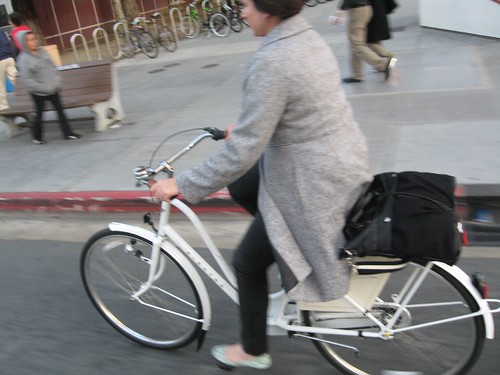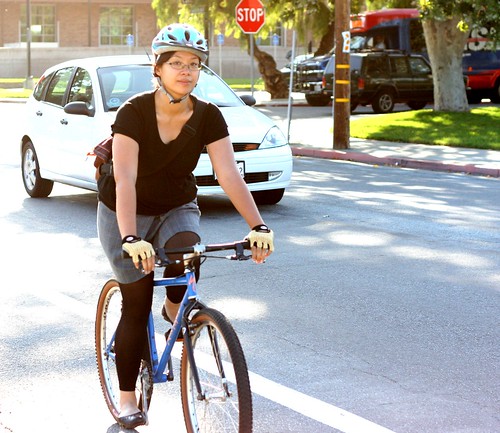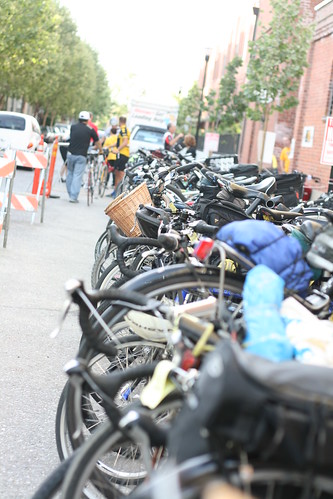- New York City, where cycling is up 66% over the last two years
- Ft Collins, CO and their 37% jump in bike commuters.
- Philadelphia's 83% increase from 2005 to 2008.
San Jose, California blows all of these out of the water with an astounding 206% increase in bike commuters from 2005 to 2008. From 2000 to 2008, the number of bike commuters doubled. From 2007 to 2008, the upward trend in San Jose continued with 80% more bike commuters.

The total bike share is still a paltry 1.23% in San Jose and 77.8% still drive to work alone, but that's still over 11,000 cyclists riding to work in San Jose, and they are much more visible than in the past.

The statistics come from analysis by the League of American Bicyclists on U.S. Census Bureau American Community Survey numbers that were released last summer. The American Community Survey and Census numbers undercount cyclists. Each person is asked for the principal transportation used for most days the previous week. I bike everyday, but I'm not counted because my principal transportation is public transportation. In San Jose, where 4.1% of commuters ride public transit, the bus bike racks and transit center bike parking are often fully utilized. 10% of Caltrain riders bring their bikes on board the train.

San Jose isn't the only large city with dramatically larger increases resulting in noticeably more bikes on the street. The bike modal share in Kansas City, Missouri rocketed an astonishing 680% from 2005 to 2008. Still, the absolute numbers are pretty pitiful -- fewer than 80 people in a population of nearly half a million people commute by bike. I see that many cyclists roll up to the Caltrain station in San Jose in a 5 minute period during the morning commute.
In spite of the national trend of more bike commuters, some cities slid back. Dallas, TX, and Newark, NJ each lost over 70% of their bike commuters in three years. Colorado Springs bike share dropped by 46% from 2005 to 2008. Some places like Virigina Beach lost and gained for a net zero change.
What do you think, South Bay cyclists? Almost all of the cyclists I talk to on my commute are brand new to it. They ride all kinds of bikes and wear all kinds of clothing.
What's your impression? Do you see this increase in your area?
10 comments:
Whoa..... bike commuting yay.
Seriously, I start doing this just because I didn't want to drive and have to fight the traffic 30 miles to work. The funny thing is that somewhere along the way, I started to really like riding my bike and now I do it for fun, and not just to get around. In fact, it's my preferred way to get around since it helps a lot with parking in busy areas like downtown shopping centers.
Sure, not everything in the 'burbs is built for biking, but it's certainly nice to see more cities defining bike lanes on busy streets and I really appreciate each the Bike Blvds. The easier cities make it, the more people will use them.
Ok, I am long-winded and really need to be posting all this stuff on my own blog. Haha!!
Well, in 2005, I drove to work. In 2008, I biked, so I'm part of the increase.
I tend to think that both the economy and the gas prices helped. Once you start doing it for a few months, it becomes habit in ways that bike-to-work-day doesn't allow.
I live and work in Kansas City Missouri and commute by bike 60-80% of the time. There has to be more than 80 that commute in Kansas City.
Though I don't know of anyone personally I have run across 4 on my commute and I work in an out of the way place.
My reasons for commuting is money (not buying an extra car) fun and exercise.
That's great and all, but come talk when your city hands out free blinky lights to commuters like NYC and that other huge city (and our home base), Greensboro, NC.
Seriously, though, that rocks.
@Reese @Wirehead @Scott -- hurray for you all! (I mean that!) and @wirehead is absolutely right, once you do it a while and get into the groove, it just becomes part of your routine. That's probably the biggest impediment as well -- most of us are so tied to routine that switching to another transportation mode (like driving solo to anything else) is difficult.
@Scott - I think the numbers are for the city itself, instead of the metro area, so it's not counting people who commute in from Overland Park (or wherever). Remember also the counts are low -- it doesn't count people who drive part way or take transit part way.
@Bikerumor: THanks for the link in here; We're talking about the proposed SJ bike plan but there's some significant contention. Also, the longtime SJDOT director who advocated for a more bike (and transit) friendly policies retired a couple of weeks ago, but I'm confident his replacement will further his agenda. We have light giveaways here as well.
Oh, somehow I missed that people who take public transit part of the way are not counted as bike commuters! Oh come come now... Just because I hop on a bus or a train in the middle doesn't make me less of a bike commuter!
I wonder what distinguishes the hybrid commuter to be classified as either transit or bike? If more than 50% of your commute time is spent on transit, then is that a transit commuter? Hmm... interesting.
@Reese: The question is what do you use for most of your commute. So for me, I'm officially a transit user.
Since we don't have any major cycling routes or bridges, it's hard to count the numbers, but bicycling is certainly more accepted here than it was just a few years ago. I see a lot more cyclists, and we have a lot more coverage in the newspaper. Our small city (< 60K) supports 3 bike shops too.
I've also posted this on EcoVelo comments section, but you all may be interesting in this too:
A source of trip data has just been released. While the ACS is useful because the sample size is large enough to tell us about individual cities, it is limited because it only tells about regular commuters. As some have mentioned, it excludes people who ride less than half the days of the week before they were interviewed and most people who ride to transit (unless the bike portion is farther than than the transit portion). And the ACS doesn't tell us anything about non-work trips.
The new source is called the National Household Travel Survey. It is a national survey and the sample is not large enough to tell us anything about individual communities. But, it asked respondents about all of their travel -- not just commuting. So it gets closer to an accurate picture of bicycling's true mode share. It also has good demographic info, including if the household is in an urban or rural area.
Here are some of the preliminary numbers:
http://www.bikeleague.org/blog/2010/01/bicycling-for-all-trips-hits-1-percent/
I'm digging deeper into the results now. Hope to post something more in depth on the League's blog soon.
Thanks, Darren -- yes, very interesting. I'll promote that to its own link.
Post a Comment